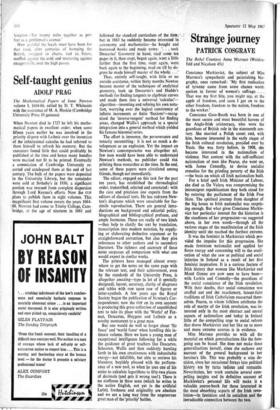Strahge journey
PATRICK COSGRAVE
Constance Markievicz, the subject of Miss Marreco's sympathetic and painstaking bio- graphy, once remarked: 'My first realisation of tyranny came from some chance words spoken in favour of women's suffrage. . . . That was my first bite, you might say, at the apple of freedom, and soon I got on to the other freedom, freedom to the nation, freedom to the worker.'
Constance Gore-Booth was born in one of the most secure and most beautiful havens of the Anglo-Irish aristocracy, who were the guardians of British rule in the nineteenth cen- tury. She married a Polish count and, with him, became interested in the early stages of the Irish cultural revolution, presided over by Yeats. She was forty before, in 1908, she became interested in the nationalism of violence. Not content with the self-sufficient nationalism of men like Pearse, she went on, with James Connolly, to devise socialist remedies for the grinding poverty of the Irish —the basis on which all Irish nationalism built.
For a brief spell Irish Minister of Labour, she died as De Valera was compromising the intransigent republicanism they both stood for by entering the parliament of the Irish Free State. The spiritual journey from daughter of the big house to Irish nationalist was surpris- ing enough. But what gives Constance Markie- vicz her particular interest for the historian is the steadiness of her progression—as suggested above, in her own words—through all the various stages of the manifestation of the Irish identity until she reached the furthest extreme.
It was the feminist in Markievicz which pro- vided the impulse for this progression. She made feminism nationalist and applied her fierce energy and consuming will to the eradi- cation of what she saw as political and social injustice in Ireland as a result of her first feminist inspiration. It is a curious feature of Irish history that women like Markievicz and Maud Gonne are now seen to have been— with Larkin and Connolly—the guardians of the social conscience of the Irish revolution. With their deaths, that social conscience was snuffed out and the reactionary, laissez-faire traditions of Irish Catholicism reasserted them- selves. Pearse, to whom folklore attributes the role of martyr of the Irish revolution, was in- terested only in the most abstract and unreal aspects of nationalism and today in Ireland little of the compelling urge to social reform that drove Markievicz and her like on to more and more extreme courses is in evidence.
Miss Marreco provides us with all the material on which generalisations like the fore- going can be based. She does not make these generalisations herself, since she eschews any account of the general background to her heroine's life. This was probably a wise de- cision, since her occasional forays into political history are by turns tedious and romantic.
Nevertheless, her work contains several com- pelling insights and its definitive account of Marklevicz's personal life will make it a valuable source-book for those interested in the most absorbing aspects of the Irish revo- lution—its feminism and its socialism and the ineradicable connection between the two.






























 Previous page
Previous page